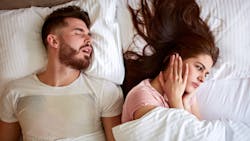Sleep divorce? How a sleep apnea appliance can save your marriage
You’re snoring. Your partner elbows you and pushes you on your side. One of you gets up to sleep in another room. You snore again. No matter what, you’re both exhausted and irritable the next day.
Sound familiar?
You’re not alone. One in four Americans choose to “sleep divorce”1 and sleep apart from their partners to have a more restful night.
Snoring can be a cause of sleep divorce; quality sleep is crucial for your overall physical and emotional well-being and sleeping apart can be a quick fix to improve at least one partner’s sleep. But it doesn’t address the underlying issue.
So what is the underlying issue causing your snoring and disrupting your sleep? Frequently, it’s caused by obstructive sleep apnea (OSA)2. OSA causes frequent blockage or collapsing of the airway throughout the night, which can decrease your blood oxygen levels. That lawnmower-like sound coming from the back of your throat is the vibration of soft tissues around your airway. Something you thought was a bad habit could actually be a serious medical condition.
The good news? Snoring and OSA are treatable conditions, and your dentist might be able to help.
Related content:
What goes on in a sleeping mouth
Sleep apnea: Listening closer for the telltale signs
Snoring isn’t sexy
It’s no secret that snoring is annoying to your partner. In fact, the sound is usually between 65-90 decibels—comparable to an old vacuum or lawnmower! The frequent awakenings are more than just annoying; they can lead to chronic sleep deprivation.
Sleep deprivation can have significant implications for couples and relationships. Researchers from the University California at Berkeley3 found that “poor sleep makes some partners feel unappreciated.” They are simply too tired to notice the little things, and too distracted to be appreciative. After just one poor night of sleep, the human brain is wired to be less empathetic and more emotionally reactive. This means we make quick judgments, take things a bit more personally, and have a hard time seeing things from our partner’s perspective. Sure, you’re in a mood—but not the mood.
Speaking of mood, untreated OSA can mess with your hormones. One of these hormones, testosterone, is mostly produced overnight and reaches its peak levels in the morning after healthy REM sleep. Frequent awakenings from snoring and OSA can prevent you from getting enough REM sleep. This may be a contributing factor to the erectile dysfunction (ED) that many men experience when they have OSA. On the positive side, treating OSA can reduce symptoms of ED, and just one additional hour of sleep has been shown to increase next-day sexual desire in healthy women.4
Here’s where your dentist comes in
Many dentists can make you a small device to effectively treat the mood-killing, argument-starting snoring and OSA.
An oral appliance5 known as a mandibular advancement device is a custom device that you wear during sleep. This device holds your jaw slightly forward to help keep your airway open. It’s that simple. No masks, no tubes, no forced air, no surgery.
These oral appliances are not the same things you get from a drug store. Drug store products are typically bulky and uncomfortable. They're not made to treat sleep apnea, and some can actually make your symptoms worse. Ask your dentist to use a medical grade device6 for comfort and efficacy. It might take a week or so to get used to wearing this while you sleep, but oral appliances should not cause pain.
Now what?
To get started, ask your doctor or a sleep coach to point you in the right direction and follow these steps:
- Get a sleep test. Many people can get this done with a take-home test in the privacy of their own bedroom.
- A doctor will evaluate the test results and prescribe treatment. If you have mild or moderate OSA, your doctor can prescribe oral appliance therapy.7
- Make an appointment with a qualified sleep dentist to evaluate your dentition, joints, and airway to make sure you’re a candidate for oral appliance therapy
- The dentist will take dental records and order a custom-made device for your oral appliance therapy.
- In a few weeks, you’ll get your new device to wear at night. Keep it clean and check in with your dentist for adjustments and follow-up visits.
OSA and snoring are incredibly common, and there’s an effective solution. You and your partner can get some peace and quiet with oral appliance therapy.
If you want to stop snoring, sleep better, and get back in bed with your partner, the solution is simple—ask your dentist if they can save your marriage.
References
- One in 4 couples sleep in separate bedrooms. Sleep Review. June 23, 2021. https://www.sleepreviewmag.com/sleep-health/one-4-couples-sleep-separate-bedrooms/
- Snoring and sleep apnea. Sleep.org. March 25, 2021. https://www.sleep.org/snoring-and-sleep-apnea/
- Anwar Y. Poor sleep can leave romantic partners feeling unappreciated. Berkeley News. January 19, 2013. https://news.berkeley.edu/2013/01/19/sleep-couples/
- Kalmbach D, Arnedt J T, Pillai V, Ciesla J. The impact of sleep on female sexual response and behavior: a pilot study. J. Sex Med. May 2-15;12(5):1221-32. doi: 10.1111/jsm.12858.
- Oral appliance therapy. American Academy of Dental Sleep Medicine. https://www.aadsm.org/oral_appliance_therapy.php
- The comfortable alternative to CPAP. SomnoMed. https://somnomed.co/en/
- AASM and AADSM issue new joint clinical practice guideline for oral appliance therapy. American Academy of Dental Sleep Medicine. https://aasm.org/aasm-and-aadsm-issue-new-joint-clinical-practice-guideline-for-oral-appliance-therapy/
About the Author
Teresa Power DeNike, BS, CCSH
Teresa Power DeNike, BS, CCSH, is the founder of Sleep Better NYC. She has a passion for helping people sleep better through education, sleep coaching, and care coordination. DeNike is board-certified in clinical sleep health with expertise in sleep apnea screening, testing, and treatment, as well as general sleep hygiene and mindset practices. Contact her at [email protected].
Updated January 24, 2023

